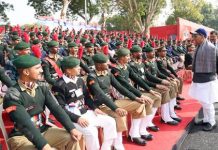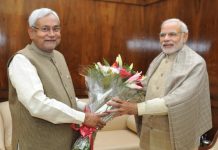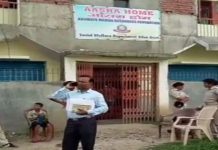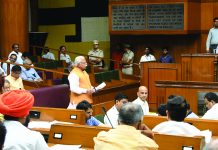The entire mission of the present day ruling lot seems to cause communal divides and strife between communities and hate for the other! One can well imagine the end result of this dangerous exercise By Humra Quraishi
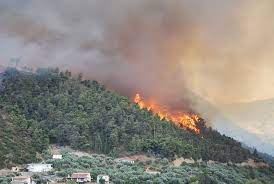
Never before one heard such communal outpourings during electioneering …speeches of the political who’s who fitted with such blatantly communal provocative jumlas or those typical one-liners, that it got hard to digest. One had to vomit out all the obnoxious stuff that the ears heard!
We are reduced to such pathetic lows that the entire mission of the present day ruling lot seems to cause communal divides and strife between communities and hate for the other! One can well imagine the end result of this ever so constant vicious poisoning made to spread around, amongst the masses. Mind you, by the very rulers of the day!
Try and read these two books by academic Professor Rakesh Batabyal – Building A Free India: Defining Speeches Of Our Independence Movement that Shaped The Nation (Speaking Tiger, 2022) and also The Penguin Book of Modern Indian Speeches (Penguin,2007).
After reading these books, you’d realize what the political personalities of the years passed by, had stood for …their speeches were fitted with the much-needed and much-desired inputs to nation building, with nationalism at the very core. To quote from Building A Free India: “As the Indian independence movement progressed—from the economic critique of colonial rule by the early nationalists, to the unequivocal demand for Purna Swaraj and the immense moral authority of the Mahatma Gandhi-led resistance—the notion of an equal society that ensured dignity to all— irrespective of caste, class, gender or religion—came to occupy a central place in it. By the time, the Constituent Assembly met in December 1946, not just civil rights, but the particular rights of women, of minorities, of the Depressed Classes and the Adivasis were being articulated and demanded, not as favours but as a matter of course…the effect of the speeches delivered by the leaders of our national movement was to focus ‘political action towards scripting an ennobling nationalism that would give us a just and equal society…’ ”
Yes, those were or rather are landmark speeches by personalities such as —from Naoroji, Surendranath Banerjee, Bhikaiji Cama, Lajpat Rai and Tilak, to Gandhi, Nehru, Ambedkar, Bose, Sarojini Naidu and Maulana Azad and many such committed citizens of this country, who spoke ever so passionately and genuinely and earnestly about our welfare in the actual sense of the term, amidst a truly democratic framework where quality and justice and secure well-being would hold high.
Man-made disasters
Well, be prepared to witness the worrying aspects on the environment front. Dismaying and depressing to see the destruction of Nature and the connected offshoots.
In these recent weeks as fire raged through the hills of Uttarakhand there seemed havoc spreading out. One can well imagine the plight of the tigers and rest of the animals and wildlife (human beings included!), surviving in and around the Corbett Park belt and far beyond. Not to be overlooked is this vital basic fact: according to latest estimates 44 per cent of the forest areas in Uttarakhand were affected by raging fires!
Surprisingly or not really, little focus on this man-made disaster. Nah, not even by those particular politicians who otherwise miss no opportunity having video films shot in and around tiger reserves…and coming out with stale speeches! It seems that all those utterances are reserved only for any of the hyped days! For the World Environment Day (5 June) or for the Earth Day (22 April) or any of the other hyped days. Otherwise fires can be seen spreading out, destroying life and livelihoods but it doesn’t seem to bother the ruling lot!
No way out from these daily doses of disasters hitting Nature and with that all of us, unless, of course, individuals come forth and cry hoarse at the destruction heaped on the environment and the connected factors. This brings me to focus on the New Delhi-based documentary filmmaker and green activist Suhas Borker. He is one of the founders of the Green Circle of Delhi, a volunteer group started in 1992 to protect Delhi’s green spaces. Last month, in April, the group launched the Citizens’ Action Plan for Climate and Heat (CAP) in Delhi. To quote Suhas Borker: “It’s a plan for the people, by the people of Delhi…We are heavily in campaign mode now, after months of drafting this plan…The Citizens’ Climate and Heat Action Plan is a document divided into six areas, all dealing with different sectors through which the adverse effects of heat and climate change can be tackled at the city level.”
I’ve always been very backward: Ruskin Bond
I recall meeting Ruskin Bond in New Delhi and also interviewing him. Putting here details from an earlier interview with him … As I interviewed him, what I loved about him was his childlike simplicity and that uncomplicated style of conversing, discussing even complicated issues in the most ‘un-complicated’ way. Absolutely down to earth, no shying away from talking about the twists and turns and those lonely phases in his life. Even describing himself to be very backward!

“I have always been very backward. I write by hand instead of working on a computer. I listen to the radio instead of watching the television. I don’t know how to operate a cell phone…Also, sometimes, I read books upside down. If I have to read a modern novel, I will read the last chapter first, usually that’s enough. And sometimes, I walk backwards.”
And his views on loneliness are equally stark, in the backdrop of the fact he opted to stay back in India although he could have moved to the U.K. Also, he didn’t marry and has no companion, “My mother did send me to England but I returned. I wanted to be back and live here in India. I chose Dehradun and later moved to Mussoorie, because earlier my mother and step-father (my mother had re-married, a Punjabi businessman) lived there. Later, I didn’t want to live in a town which was too far from Delhi, because of my writing and meetings with my publishers…I stay in Mussoorie with an ‘adopted’ family, so that way the apartment is full of people. The apartment has four rooms and we are twelve people living in it. The family consists of a set of parents and their two sons who are both married and have children. Also, this profession – writing – is such that you can only pursue it in solitude. You have to be alone so that you can write. In the evenings I do go down to some friend’s home for a chat and a drink. I have two or three such close friends…Didn’t marry, couldn’t find love…nah, couldn’t find love. At times those weekly horoscopes in the various publications predicted love on the way but no love came up.”
And when I had asked him to comment on the near-nil portrayal of sexual romance in his writings he quipped, “You’re saying this, but once, I was hauled up in court on charges of obscenity. Yes I was, for my novella titled ‘The Sensualist’. I had to appear in court, though I was later acquitted. And I must tell you that there was nothing explicit in the book — maybe some sexual references in a romantic context.”
I had also asked him about the spurt in rape cases. ‘This could be because of sexually explicit films being screened on the television, affecting young minds. Then, they are never told that romantic love is one thing and sexual anarchy is different. Our society is too repressed; people try to break free and go on a rampage. Crime is worsening here.”


